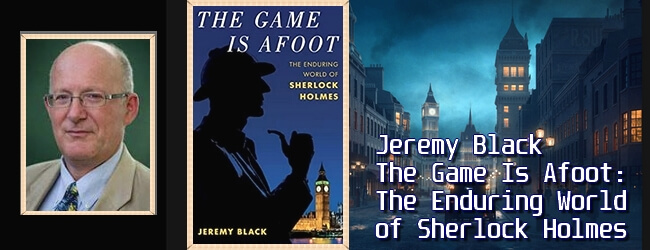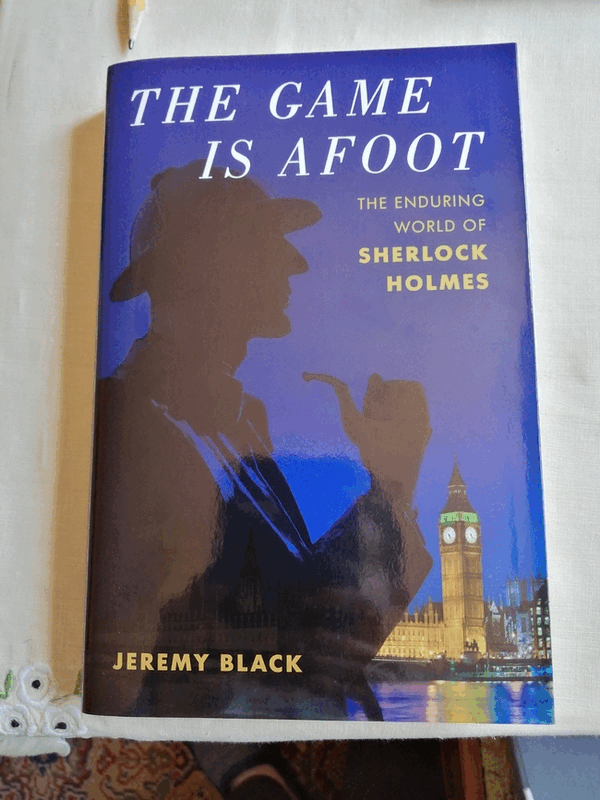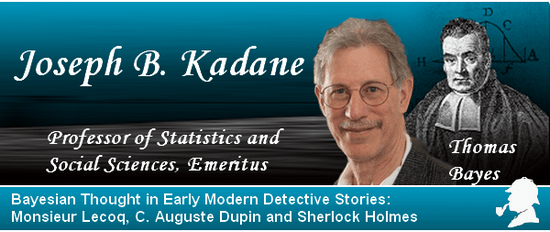
Professor Jeremy Black
The Game Is Afoot: The Enduring World of Sherlock Holmes


INTRODUCTION
We know the works of Professor Jeremy Black for years, and you can view one of his lectures on our site. (Jeremy Black about Sherlock Holmes) His new book, The Game Is Afoot was published on the 4th of June 2022. Revati, the editor of our site
had been asked in 2021 to write a short opinion about it which appeared on the back cover. We started to
arrange an interview with the author in that year, and he agreed on giving us a short interview, finding
time for it after the publishing of the book. We are honoured.
Jeremy Black MBE is a British historian, writer, and former professor of history at the University of
Exeter. He graduated from Queen’s College, Cambridge, with a starred first and then did postgraduate
work at St. John’s and Merton Colleges, Oxford. He taught at Durham University from 1980 as a lecturer,
then professor. He was awarded a PhD from Durham, entitled British Foreign Policy 1727–1731, in 1983.
He is the author of over 180 books, mostly on 18th-century British politics and international relations, and
has been described as "the most prolific historical scholar of our age". He has published widely on
military and political history. The topics he deals with in his books are eighteenth century British,
European and American political, diplomatic and military history, the history of the press, cartography,
warfare, culture and on the nature and uses of history itself. He is a major exponent of military, diplomatic
and cartographic history and has been important in helping the British to look at their past, as well as in
representing British history to foreign audiences.
In 2000, he received the MBE title for his services to postage stamp design as an adviser of the Royal
Mail from 1997. In 2008, he was awarded the Samuel Eliot Morison Prize for lifetime achievement as
afforded by the Society for Military History.
1. When did you take interest in history and politics?
I had an interest in history from when I was a child.
2. When have you met the name of Sherlock Holmes for the first time?
It happened when I was a teen. My father had Sherlock Holmes books.
3. Which is your favourite Holmes adventure?
As I live in Devon, my favourite story is The Hound of the Baskervilles.
4. Who is your most beloved Holmes actor and which adaptation you like the most?
Jeremy Brett. I think he captures best the detective’s personality. I do not like Benedict Cumberbatch.
5. When did the idea come to write a book about Sherlock?
And what encouraged you?
I decided to write the book to go alongside my The Importance of Being Poirot. As with my other works
on literary history e. g. on Bond, they reflect my universal happiness with the standard canon and the
approach to it.
6. Why did you dedicate the book to Dan Hannan?
Dan Hannan is a friend of mine, that’s the reason.
7. Could you tell us something about your future plans (new books, lectures, etc.)?
I’m currently getting older, but I hope I will be able to go on writing.
Dear Professor Black, thank you so much for answering our questions. We wish you lots of strength and
good health to fulfil your writing plans.
BOOK REVIEW - THE GAME IS AFOOT
Sometimes you instinctively know even before reading a book that it will be great. I felt it when I
received a copy of Professor Jeremy Black’s new book, The Game Is Afoot. The publisher, Rowman &
Littlefield honoured me by asking me to read it before it comes out and I was also asked to write a short
recommendation. I received a complimentary copy for my cooperation.
The author writes about the different aspects of the Canon in a very delightful and polished way. The
amount of detail and information he deals with is mind-blowing, yet the book never turns into a boring
list of statistics. The Professor points out how many and how complex data can be found in the adventures
– they tell so much about the age in which the detective led his fictional life. At the same time these data
reveal surprisingly lot about Sherlock’s city, London. Doyle masterfully shows that London has its
beautiful and horrible parts as well, and while he does this, he flashes some snapshots of the society.
Professor Black does the same in a more detailed way, listing data with meticulous care – data that many
think to be irrelevant while they read the adventures. They may think these are not so important, as the
majority of the readers looks for those mesmerizing deductions. But thanks to these exact „irrelevant”
data we can get a more comprehensive and obvious picture about the age of Sherlock. The Professor
reveals how many sociological aspects can be found in these small details. We get information on class-
division, on differences in culture and income, on the state of public healthcare system. And he does it in
a very enjoyable way, the book is very easy to read.
It’s especially interesting to learn about British country life, society and politics. It’s great that we got to
know more about the life of women in the Victorian era. The detective had several female clients, from
nearly all classes. During his investigations he often meets people who have difficult lives, and it’s clear
that he has more empathy towards the poor and miserable than the representatives of the elite. (LINK:
Sherlock Holmes and women)
I like how the author shows who might have been the models of the famous and/or influential people who
appear in the adventures – socialites, politicians or diplomats. It proves that Doyle was very interested in
politics, and masterfully incorporated actual situations into the stories.
I highly recommend this lovely and informative book to everyone who wants to know more about the
everyday lives of people in Victorian London. I do hope that after reading it people will pay more
attention to these small details and references when they enjoy the marvellous adventures of the greatest
detective.
We’d like to express our thanks and gratitude to Professor Jeremy Black for taking the time and
answering our questions about this new book and other topics.
You can look inside or buy the book here:
Amazon.com
The book review was written & the interview was conducted by: Zsófia Marincsák (Revati)
We are very proud to be able to comment on Professor Jeremy Black's wonderful book:


Recommended site:
Sherlock Holmes
Conan Doyle’s Sherlock Holmes novels and short stories
Sherlock Holmes illustrators


Bayesian Thought in Early Modern Detective Stories
Professor Joseph Born Kadane and the Institute of Mathematical Statistics
gave their permission to publish this article on our website.

|












